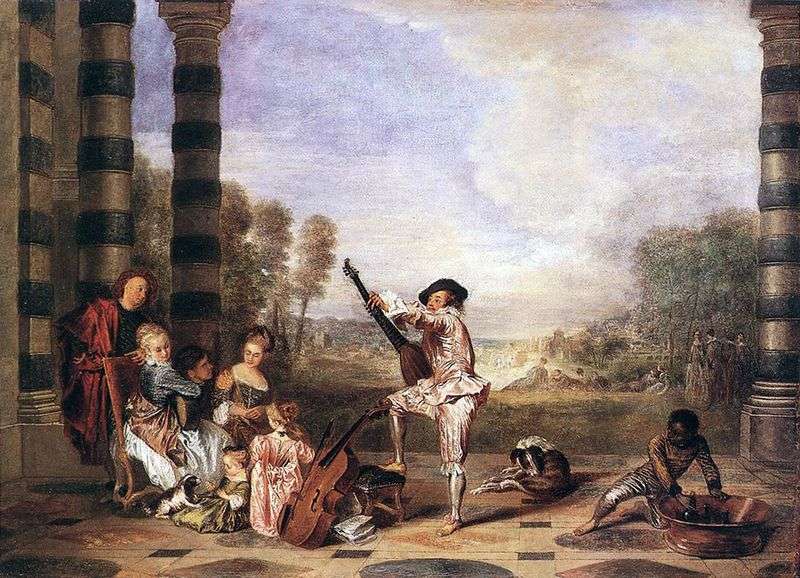
Painting of the French painter Antoine Watteau “Musical Party in the Summer Theater”. The size of the painting is 67 x 93 cm, canvas, oil. This painting also has another name: “The charms of life.”
Watteau was very fond of theatrical subjects, although he hardly reproduced the episodes of certain performances. In the theater of the artist attracted the flight of the imagination, the living embodiment of fantasy, and finally, the sincerity of the game that Watteau did not find in life, like acting.
The nature of the figurative world of Watteau painting corresponds to the smoothness of small, as if vibrating strokes, the variability of color nuances, the tenderness of refined colorful harmonies. After the undivided dominance of the historical genre and allegorical scenes, Watteau discovered a variety of real types of French society of that time – soldiers and poor Savoyars, nobles and villagers, actors of fairgrounds and theaters of comedies.
Time from 1720 to 1780 was the most brilliant period in the history of the Frantisez theater: at this time the drama of Voltaire dominated the stage and was played by a number of excellent artists such as Grandval, Leken, Bellecour, Previl, Mole, Monvel, Brizar, Dugazon, Cleron, Dungeville, Comte, etc. In 1803 the theater settled for a permanent stay in Palais Royal, where Moliere played at the time, and remains there until now.
Until now, the most important advantage of the Theater-Francais is the exemplary ensemble that, combined with a careful staging, vigilant diligence and respect for traditions, delivers a brilliant performance to the theater not only in the works of the great French classics, but also in dramas and comedies of the 19th century.
In general, France still retains the leading position in the field of stage play. This is explained not only by the fact that the French, by the very nature of their national character, are predisposed to theatrical activity. The school plays a comparatively secondary role, although among the people who intend to enter the theater and seek to enter the Paris Conservatoire, the art of reading and recitation is highly developed; fine diction is the only integral quality of all French actors, to which they are partly responsible for school preparation.
The main means of artistic education of future stage figures is the abundance of beautiful living specimens on the Parisian stages, a close connection connecting the Conservatory with the exemplary stage of the Theater of the French Comedy, and the careful observance of the traditions left to the modern generation of actors by its famous predecessors.

 (2 votes, average: 4.50 out of 5)
(2 votes, average: 4.50 out of 5)